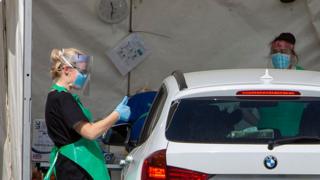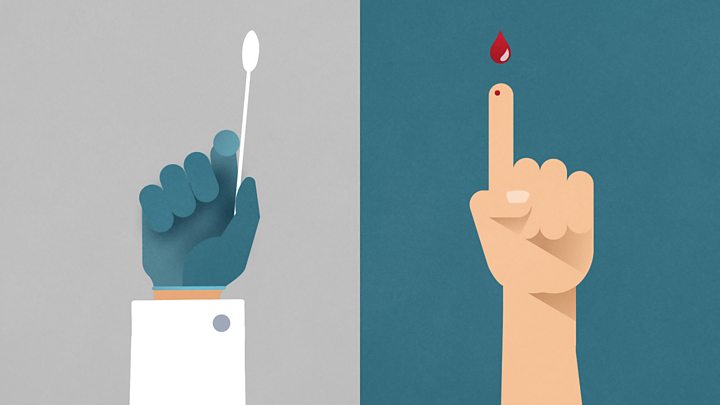Coronavirus: Am I eligible for a test?
 Image copyright
Getty Images
Image copyright
Getty Images
Anyone with symptoms can apply for a test to see if they have coronavirus.
Getting tested - and then tracing people's contacts - is considered vital to enable health experts to contain local outbreaks.
Can I get tested?
Tests are now available to all adults and most children in the UK with a fever, a new continuous cough or a loss of smell or taste.
In England and Wales you can apply for a swab test for yourself, or for anyone in your household, if you or they have symptoms
In Northern Ireland and Scotland anyone over the age of five with symptoms can get tested.
The tests are generally the same for children and adults.
How does the test work?
This test to see if you currently have the virus involves taking a swab up the nose and the back of the throat.
This can be done by the person themselves or someone else.
But these tests won't show if you have had Covid-19 in the past.
Antibody tests - which do look for evidence of past exposure - use blood samples.
The UK now has capacity for about 80,000 antibody tests a day, but these are only offered to health and care staff and should only be carried out by a healthcare professional.
They are also used to test random samples of people to estimate the level of exposure across the country.
Why is testing important?
Testing is essential if contact-tracing systems now in place across the UK are to work effectively, help stop the spread of the virus and avoid the need for UK-wide lockdowns.
And in theory it can help people, including NHS workers, know whether they are safe to go to work.
Testing can also let the health service plan for extra demand, and inform government decisions around social distancing.

Is testing different for those in care homes?
Staff and residents in care homes will start receiving regular coronavirus tests from the week of 6 July.
People working or living in care homes have been able to be tested even if they don't have symptoms since the end of April - but not routinely.
There have been calls for hospital staff to also be routinely tested regularly, but a letter sent to hospital bosses indicated this is not the current plan for NHS staff.
How reliable are the tests?
Scientists at the University of Bristol believe 20% of positive cases could falsely appear as negative, wrongly telling someone they are not infected.
This can be because the swab sample wasn't good enough, the stage of infection someone's at when tested, or problems in the lab.
The Hospital Consultants and Specialists Association (HCSA), which represents hospital doctors, has called for NHS staff to be tested more than once.
How long does it take to get a result?
Prime Minister Boris Johnson has pledged tests would be processed within 24 hours by the end of June, except where there were difficulties with the post.
Speed is important because delays give the virus more time to spread.
How many tests are being carried out?
The total capacity for the number of tests that can be done each day is now close to 300,000.
But this includes kits posted out to homes - some of which may never be returned - as well as those carried out at drive-thru centres.
The total also counts antibody tests and those carried out as part of a surveillance study by the Office for National Statistics, designed to give an idea of how many people have Covid-19, with and without symptoms, in the community.
During the coronavirus epidemic, the government has been challenged over its testing capacity and the data it has presented.
The government has now changed the way it sets out testing data.
Where do I get tested?
There are several options.
You can travel to a drive-through testing site, visit a mobile testing unit or get a home testing kit delivered.
Testing at an NHS facility, such as a hospital, is available for patients and some NHS workers.
What is contact tracing?
Once someone tests positive for Covid-19, they will be told to self-isolate for seven days - and their recent close contacts will be traced and told to isolate for 14 days by their nation's test and trace service, even if they don't have symptoms.
Close contacts include household members and anyone who has been within 2m (6ft) of the positive person for more than 15 minutes.
Read more about contact tracing in England, Scotland, Wales and Northern Ireland.
Follow Rachel on Twitter
What do I need to know about the coronavirus?
Have you been tested? Or are you waiting for a test?
Please include a contact number if you are willing to speak to a BBC journalist about your experience.